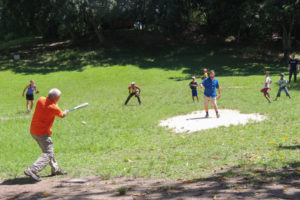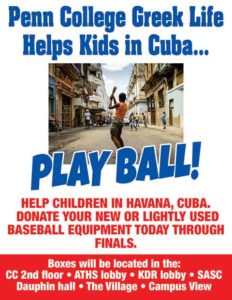Baseball Equipment Donations Sought by Greek Life for Cuba
Sunday, November 20, 2016
Members of Pennsylvania College of Technology’s Greek Life have teamed up with a math professor to solicit donations of used baseball equipment to be sent to young baseball players in Cuba.
The college community is asked to look for baseball bats, gloves and balls while at home for the Thanksgiving break and bring the equipment back to campus. Donation boxes will be in central locations in numerous campus buildings: the Bush Campus Center, Student & Administrative Services Center, Breuder Advanced Technology & Health Sciences Center, Dauphin Hall, The Village, Campus View, and Hager Lifelong Education Center.
The outreach was inspired by a chance encounter on the grounds of Ernest Hemingway’s home in a suburb of Havana. There, Curt Vander Vere, assistant professor of mathematics, and three of his former students saw a team of young baseball players and their coach engaged in a game, making do with only a few pieces of old equipment.
 “They were a great group of kids. Not only did they invite us to join them in their practice, they shared their gloves and other equipment, and taught us the fundamentals of the game,” Vander Vere said. “They were well-schooled in the basics of baseball. Their coach was patient and caring, not only for the children but for us.”
“They were a great group of kids. Not only did they invite us to join them in their practice, they shared their gloves and other equipment, and taught us the fundamentals of the game,” Vander Vere said. “They were well-schooled in the basics of baseball. Their coach was patient and caring, not only for the children but for us.”
Vander Vere and the students traveled to Cuba in July as part of a Chautauqua course sponsored by the National Science Foundation and coordinated by Ancient Explorations, a branch of the Maya Exploration Center. The course was titled “Cuba – Its History, Culture and Artistic Traditions.”
Joining their professor on the trip were Brendon Dibble, Leo J. Ravina and Anthony V. Rode. All had taken the Mathematics in Non-European Cultures class (MTH 155/156) taught by Vander Vere and D. Robert Cooley, assistant professor of anthropology/environmental science. As part of MTH 156, students study abroad in Central and South America.
Dibble, a sophomore in advertising art, is from Douglassville; Ravina, a senior in industrial design, hails from Hazleton; and Rode, now residing in Palm Coast, Florida, graduated in May with a degree in construction management.
 Now, Vander Vere is joined by a team of Penn College fraternity brothers in his attempt to collect “well cared-for used baseball gear,” according to Colin D. McOdrum, a senior in welding and fabrication engineering technology from Glenmoore.
Now, Vander Vere is joined by a team of Penn College fraternity brothers in his attempt to collect “well cared-for used baseball gear,” according to Colin D. McOdrum, a senior in welding and fabrication engineering technology from Glenmoore.
“As a member of Phi Mu Delta, we help the Hepburn Lycoming Little League during their season,” McOdrum said. “When Van (Vander Vere) reached out to me, I thought of those kids. They had the support, the gear and the sponsors to have the best experience possible. I thought it would be nice to share that same experience with kids that are much less fortunate than the Hepburn Lycoming Little League.”
Vander Vere says the equipment will be delivered directly to the same coach he met in Cuba. The delivery will be made in March by a friend and colleague of his, Edwin Barnhart, director of the Maya Exploration Center.
Vander Vere explains that the youth baseball teams in Cuba are community-based and refer to themselves as “little leagues,” but are not yet sanctioned by Little League International, however negotiations are underway.
For more information, contact Vander Vere at ext. 7852; Allison Bressler, assistant director for student activities for programming and Greek life, at ext. 7286; or email the Penn College Greek Senate.
The college community is asked to look for baseball bats, gloves and balls while at home for the Thanksgiving break and bring the equipment back to campus. Donation boxes will be in central locations in numerous campus buildings: the Bush Campus Center, Student & Administrative Services Center, Breuder Advanced Technology & Health Sciences Center, Dauphin Hall, The Village, Campus View, and Hager Lifelong Education Center.
The outreach was inspired by a chance encounter on the grounds of Ernest Hemingway’s home in a suburb of Havana. There, Curt Vander Vere, assistant professor of mathematics, and three of his former students saw a team of young baseball players and their coach engaged in a game, making do with only a few pieces of old equipment.
 “They were a great group of kids. Not only did they invite us to join them in their practice, they shared their gloves and other equipment, and taught us the fundamentals of the game,” Vander Vere said. “They were well-schooled in the basics of baseball. Their coach was patient and caring, not only for the children but for us.”
“They were a great group of kids. Not only did they invite us to join them in their practice, they shared their gloves and other equipment, and taught us the fundamentals of the game,” Vander Vere said. “They were well-schooled in the basics of baseball. Their coach was patient and caring, not only for the children but for us.”Vander Vere and the students traveled to Cuba in July as part of a Chautauqua course sponsored by the National Science Foundation and coordinated by Ancient Explorations, a branch of the Maya Exploration Center. The course was titled “Cuba – Its History, Culture and Artistic Traditions.”
Joining their professor on the trip were Brendon Dibble, Leo J. Ravina and Anthony V. Rode. All had taken the Mathematics in Non-European Cultures class (MTH 155/156) taught by Vander Vere and D. Robert Cooley, assistant professor of anthropology/environmental science. As part of MTH 156, students study abroad in Central and South America.
Dibble, a sophomore in advertising art, is from Douglassville; Ravina, a senior in industrial design, hails from Hazleton; and Rode, now residing in Palm Coast, Florida, graduated in May with a degree in construction management.
 Now, Vander Vere is joined by a team of Penn College fraternity brothers in his attempt to collect “well cared-for used baseball gear,” according to Colin D. McOdrum, a senior in welding and fabrication engineering technology from Glenmoore.
Now, Vander Vere is joined by a team of Penn College fraternity brothers in his attempt to collect “well cared-for used baseball gear,” according to Colin D. McOdrum, a senior in welding and fabrication engineering technology from Glenmoore.“As a member of Phi Mu Delta, we help the Hepburn Lycoming Little League during their season,” McOdrum said. “When Van (Vander Vere) reached out to me, I thought of those kids. They had the support, the gear and the sponsors to have the best experience possible. I thought it would be nice to share that same experience with kids that are much less fortunate than the Hepburn Lycoming Little League.”
Vander Vere says the equipment will be delivered directly to the same coach he met in Cuba. The delivery will be made in March by a friend and colleague of his, Edwin Barnhart, director of the Maya Exploration Center.
Vander Vere explains that the youth baseball teams in Cuba are community-based and refer to themselves as “little leagues,” but are not yet sanctioned by Little League International, however negotiations are underway.
For more information, contact Vander Vere at ext. 7852; Allison Bressler, assistant director for student activities for programming and Greek life, at ext. 7286; or email the Penn College Greek Senate.